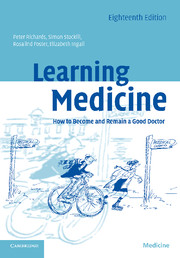Book contents
- Frontmatter
- Contents
- Foreword
- Preface
- 1 Why medicine and why not?
- 2 Opportunity and reality
- 3 Requirements for entry
- 4 Choosing a medical school
- 5 Application and selection
- 6 Interviews
- 7 Medical school: the early years
- 8 Medical school: the later years
- 9 Doubts
- 10 The new doctor
- 11 Developing your career
- 12 Career opportunities
- 13 Privileges and responsibilities: avoiding the pitfalls
- Postscript
- Appendices
- Index
9 - Doubts
Published online by Cambridge University Press: 02 December 2009
- Frontmatter
- Contents
- Foreword
- Preface
- 1 Why medicine and why not?
- 2 Opportunity and reality
- 3 Requirements for entry
- 4 Choosing a medical school
- 5 Application and selection
- 6 Interviews
- 7 Medical school: the early years
- 8 Medical school: the later years
- 9 Doubts
- 10 The new doctor
- 11 Developing your career
- 12 Career opportunities
- 13 Privileges and responsibilities: avoiding the pitfalls
- Postscript
- Appendices
- Index
Summary
Doubts are a very normal part of most people's lives. No university course, and no professional training, is more likely to raise doubts than medicine: academic doubts, vocational doubts, and personal doubts.
As Richard Smith, formerly editor of the British Medical Journal, once wrote:
Once they arrive, medical students are put through a gruelling course and exposed younger than most of their non-medical friends to death, pain, sickness, and what the great doctor William Osler called the perplexity of the soul. And all this within an environment where “real doctors” get on with the job and only the weak weep or feel distressed. After qualification, doctors work absurdly hard, are encouraged to tackle horrible problems with inadequate support, and then face a lifetime of pretending that they have more powers than they actually do. And all this within an environment where narcotics and the means to kill yourself are readily available. No wonder some doctors develop serious problems.
Few would-be medical students never have reservations whether medicine is right for them and they for medicine. All too often these doubts have concentrated too much on the process of getting into medical school and too little on what being a doctor is all about, the consequence of which being to add to the cynicism and disillusionment which is rife among junior doctors. After working for several years on the BBC television series Doctors To Be, the producer Susan Spindler recognised this problem and offered some good advice:
It's hard to take a career decision at the age of 17; at that age many people haven't quite decided who they are and many of us change almost beyond recognition between the ages of 17 and 25.[…]
- Type
- Chapter
- Information
- Learning MedicineHow to Become and Remain a Good Doctor, pp. 122 - 129Publisher: Cambridge University PressPrint publication year: 2007



